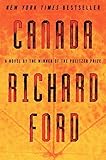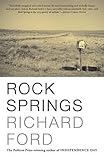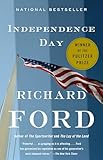 Halfway through Richard Ford’s new novel, Canada, the young narrator, Dell, having been abandoned by his family, is spirited across the border between Montana and the Canadian province of Saskatchewan in the back seat of a car driven by family friend Mildred Remlinger. The world Dell has known in Great Falls, Mont., is in ruins following the arrest of both of his parents in connection with a botched bank robbery, and the world he is about to enter is entirely unknown to him:
Halfway through Richard Ford’s new novel, Canada, the young narrator, Dell, having been abandoned by his family, is spirited across the border between Montana and the Canadian province of Saskatchewan in the back seat of a car driven by family friend Mildred Remlinger. The world Dell has known in Great Falls, Mont., is in ruins following the arrest of both of his parents in connection with a botched bank robbery, and the world he is about to enter is entirely unknown to him:
Ahead, where the highway was only a pencil line into the distance, two dark low bumps became visible on the horizon, backed by blue sky in which there was not a floating cloud. I wouldn’t have seen the bumps if I hadn’t looked where Mildred was looking. It was Canada there. Indistinguishable. Same sky. Same daylight. Same air. But different. How was it possible I was going to it?
The two dark low bumps cohere into huts for customs officials on this lonely border road, and once Dell passes them, the novel, which has been spinning its wheels for more than 200 pages, suddenly locks into gear and begins to cruise toward greatness. In part, this sense of velocity is literal: after weeks of hanging around waiting for his parents to commit the idiotic crime announced on the first page of the novel, Dell is finally on the move, in the back of a car driven by a near-stranger, observing the world not through the eyes of a bored and perplexed teenager, but through the eyes of a first-class novelist inhabiting the consciousness of a frightened 15-year-old boy. Buzzards hang “in the sky, curving and motionless.” The night air is “sweet as bread.” The land itself is not merely land, but in a marvelously unforced way, an indicator of the narrator’s sense of loss and lostness:
Once we were out of the hills, there were no landmarks…There were even fewer trees. A single low white house with a windbreak and a barn and a tractor could be seen in the distance, then later another one. The course of the sun would be what told you where you were — that and whatever you personally knew about: a road, a fence line, the regular direction the wind came from.
Ford’s characters, too, which in the American portions of the novel, have been largely made up of loose collections of physical description and character tics, become stranger and far more interesting once we hit Canada. The first person Dell meets in Canada is the novel’s single great achievement: a gruff, unsavory Métis Indian named Charley Quarters, who lives alone in a filthy trailer and spends his days leading Americans on geese-hunting expeditions, but also wears lipstick and eye shadow and writes poetry.
Charley Quarters is the real thing, the sort of character who could exist nowhere but in fiction, but who feels utterly alive and real on the page, and for 50 pages or so, this odd, misbegotten novel comes alive as Dell settles into his strange new world, living in a shack in the middle of ghost town in the process of being reclaimed by the surrounding prairie. And then — splat — the book dies again, never to show any more than the occasional sign of life for another hundred-odd frustrating pages.
In truth, Canada is two novels, neither of which has much to do with the other, or, for that matter, with Dell, its ostensible narrator and central character. In the first novel, set in Montana in the summer of 1960, Dell’s parents, Bev and Neeva Parsons, rob a bank in a manner so criminally inept and for reasons so lacking in basic common sense that Ford is forced to spend dozens of pages just making it sound like actual human beings might do such a thing. The second novel, set in the fictional town of Fort Royal, Saskatchewan, focuses on Arthur Remlinger, a mysterious American hotelier and one-time political hothead who is in hiding after committing a politically motivated crime in Detroit years before.
Neither of these crimes, along with a double murder that, again, Ford announces on page one, make much sense, but from the reader’s point of view, the far larger problem is how little they touch on the life of the narrator. The bank robbery, which puts his parents in jail and causes his twin sister, Berner, to run away to her own, separate fate, radically alters the trajectory of Dell’s life, but up until then, it really has nothing to do with him. For 200 pages, Dell moons around Great Falls, friendless, reading obsessively about chess and beekeeping, while his idiot father loses job after job and gets on the wrong side of some no-good local Indians, leading him to conclude that his only hope is to pack his wife in the car and rob a bank in North Dakota without bothering to wear a mask or otherwise cover his tracks.
Once in Canada, after a few chapters in which Dell finally seems to be participating in his own life, Ford loses interest in his fate and changes the subject to Arthur Remlinger’s crime, which has even less to do with Dell than the bank robbery. The reader is asked to wade through page after page of exposition about what Arthur did years ago and why he did it, largely delivered in summarized dialogue by Charley Quarters. Why is Charley telling young Dell all this? I couldn’t figure that one out, but by then, frankly, my dear, I didn’t give a damn.


 One comes away from Canada feeling as though a less gifted author was trying to write a knock-off of a Richard Ford novel, and has made a hash of it. All the classic Fordisms are there: the sensitive teen at the mercy of hopelessly bad parents, the lonesome Western landscapes, the borderline clichés dressed up as prairie wisdom, the sense that all is in elegy to a lost and fallen world. But unlike in Ford’s best work — the first two Frank Bascombe novels, The Sportswriter and Independence Day, and the excellent story collection, Rock Springs — where all this stuff works, in Canada, the old Ford magic comes off as half-baked and pretentious.
One comes away from Canada feeling as though a less gifted author was trying to write a knock-off of a Richard Ford novel, and has made a hash of it. All the classic Fordisms are there: the sensitive teen at the mercy of hopelessly bad parents, the lonesome Western landscapes, the borderline clichés dressed up as prairie wisdom, the sense that all is in elegy to a lost and fallen world. But unlike in Ford’s best work — the first two Frank Bascombe novels, The Sportswriter and Independence Day, and the excellent story collection, Rock Springs — where all this stuff works, in Canada, the old Ford magic comes off as half-baked and pretentious.
Richard Ford has earned his place in the pantheon of late-20th-century American novelists, and 15 years ago, one could plausibly argue he was among the best Americans writing, but his later work — that is, most of what he’s done since he won the Pulitzer Prize for Independence Day in 1996 — has seemed of a lesser quality. Now, this new book, Canada, exhibits a degree of badness that makes one wonder if the earlier stuff was really all that good. Wasn’t Frank Bascombe always a wee bit of a gasbag? Didn’t some of the stories in Rock Springs seem a little, well, contrived?
If you have a soft spot in your heart for Frank Bascombe and the other hard-luck characters in Ford’s earlier fiction, you may well want to skip this trip across the border.



